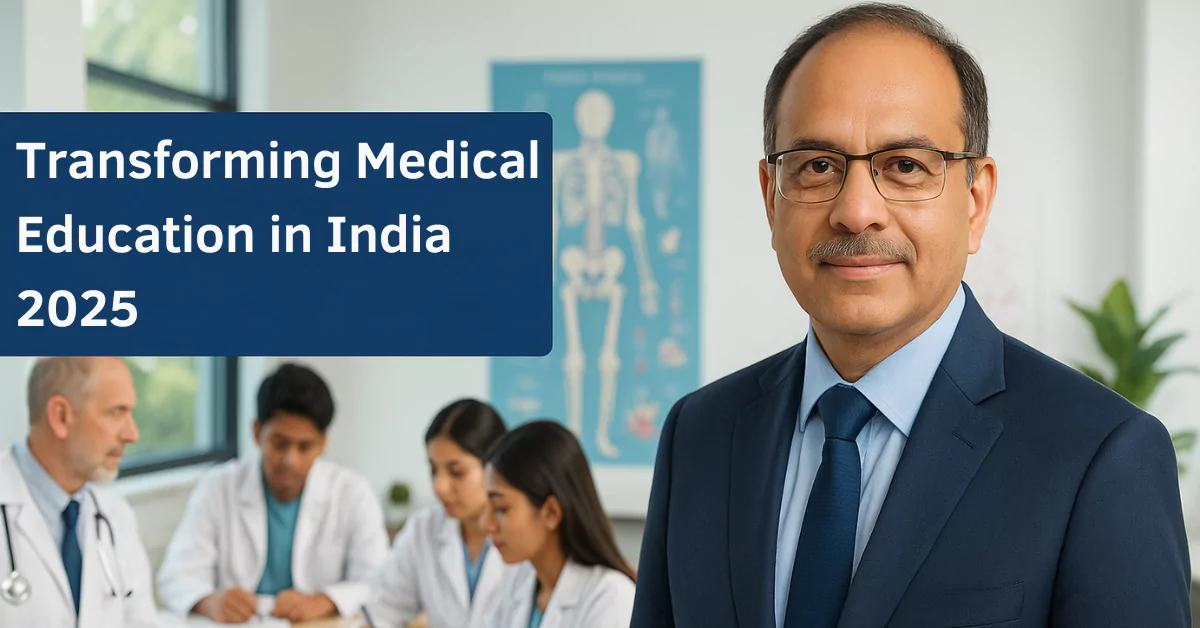Medical Education 2025: The Chairman of the National Medical Commission (NMC), Dr Abhijat Sheth, has proposed a transformative vision for undergraduate (MBBS) and postgraduate (PG) medical training.
Speaking at the 86th Foundation Day celebrations of the IMA Hyderabad City branch, Dr. Sheth emphasized that the NMC’s core responsibility is to ensure high-quality medical education by formulating policies, coordinating with State Medical Commissions, and providing expert guidance to the government.
1:1 MBBS-PG Seat Ratio: Equitable Expansion
India has long faced a shortage of doctors, making it challenging to meet the World Health Organisation’s recommended doctor-patient ratio of 1:1000. To address this, the NMC has approved an increase to 1.23 lakh MBBS seats for the academic year 2025-26.
Dr. Sheth cautioned that expanding undergraduate medical seats without a proportional rise in postgraduate opportunities could create a shortage of qualified specialists. To maintain quality medical education, he proposed that MBBS and PG seats should ideally maintain a 1:1 ratio, ensuring every graduate has the opportunity to pursue specialization.
Read Also: Doctor-Patient Ratio in India Reach WHO Target: South India Leads, Rural Gaps Persist
NMC Chairman Proposes AI Integration in Medical Education 2025
Technology is reshaping education across all fields, and medicine is no exception. Dr. Sheth highlighted the need to supplement traditional medical training with artificial intelligence (AI), virtual learning modules, and skill laboratories.
These advanced tools can help medical students:
- Develop specialty-specific clinical skills
- Enhance patient communication and bedside manners
- Engage in research and clinical studies
Dr. Sheth clarified that AI and digital tools are meant to complement, not replace, hands-on clinical training, creating a holistic, modern learning experience for medical students.
Read Also: AI & Modern Technology in Indian Medical Education: Trends, Challenges & Future Roadmap
Institutional Responsibilities and Future Outlook
The NMC’s vision extends beyond curriculum updates. Medical colleges are encouraged to adopt competency-based education models, emphasizing real-world application of knowledge. By focusing on practical skills and clinical competence, institutions can prepare healthcare professionals to meet the demands of modern medicine.
The integration of AI and digital tools is expected to bridge gaps in traditional teaching, offering diverse learning experiences that equip students for a rapidly evolving healthcare landscape.
Read Also: NMC Chief Proposes Medical College Rating System to Enhance Education Standards
The Road Ahead for Medical Education in India
Dr. Abhijat Sheth’s proposals signal a forward-thinking shift in India’s medical education system. By advocating for a balanced increase in MBBS and PG seats and embracing AI-driven learning tools, the NMC aims to produce a new generation of doctors who are highly skilled, adaptable, and technologically competent.
These initiatives reflect the NMC’s commitment to:
- Maintaining high-quality medical education standards
- Encouraging innovation and technology integration
- Meeting the growing healthcare needs of India
As these changes are implemented, India is set to witness a new era in medical training, where tradition meets technology, and quantity aligns with quality.
Read Also: India’s Medical Education Revolution: NMC Reforms, CBME, NEXT & More

